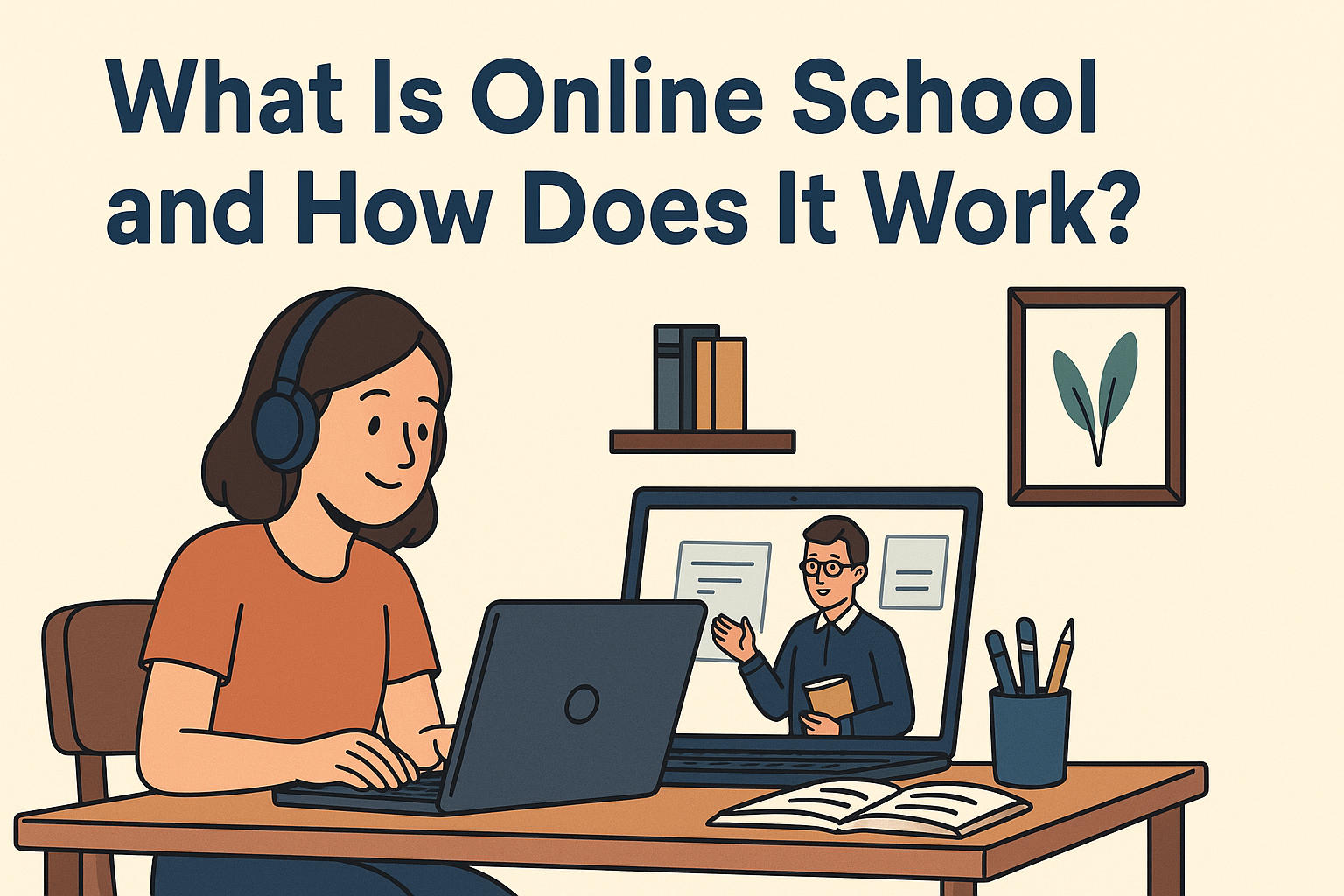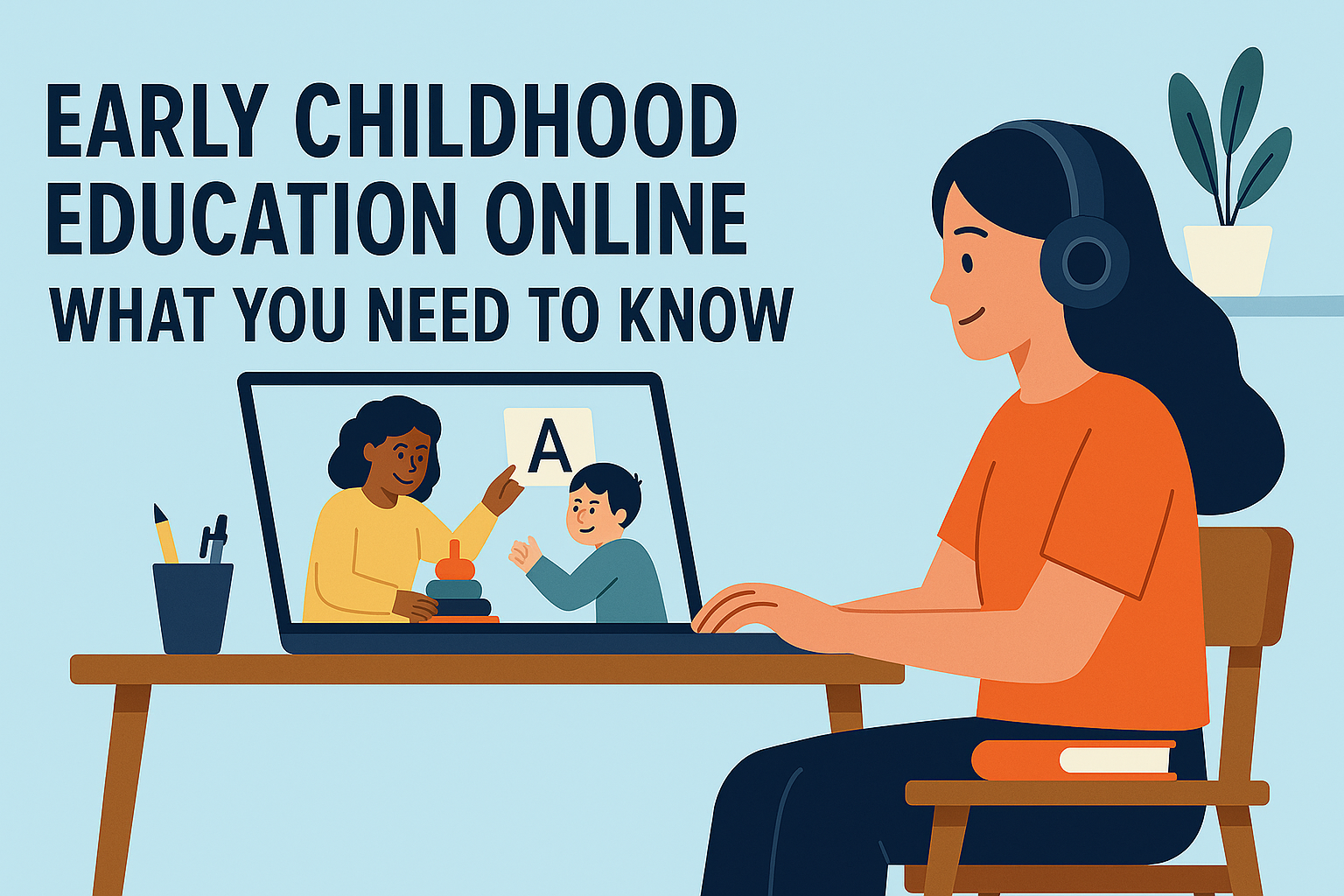What Is Online School and How Does It Work?

Online school is a way to learn without going to a physical classroom. You do your lessons, tests, and assignments on a computer or tablet. Many students now choose this option because it fits their lifestyle better.Online school works for all grade levels. You can find online programs that meet your needs from elementary to high school and even college. These schools follow the same standards as traditional ones.
More people are choosing online school today than ever before. This shift has made it easier for students in remote areas, those with busy schedules, or kids who need more flexibility. Online school is not just a trend — it’s a real alternative to in-person learning. In this post, we’ll look at how online school works, its benefits, challenges, and who it helps most. We’ll also compare it to regular schools and answer common questions.
What Is Online School?
Online school is a way to get an education through the internet. Instead of going to a building every day, you log in from home or any place with internet access. You use a learning platform to see your lessons, turn in homework, and talk to teachers. Some classes are live, where you join a video call. Others let you watch recorded videos when it’s convenient for you.
Teachers guide your learning. They give you feedback, answer questions, and help you stay on track. You may also work with other students through group projects or discussions. Online school offers structure, but gives you more control over your schedule. It can be full-time or part-time, depending on your needs.
Benefits of Online School
Online school gives you freedom with your time. You can study early in the morning, late at night, or during breaks. This makes it easier to balance school with sports, jobs, or family life. It removes location limits. If you live far from a good school, online learning connects you with top teachers and courses. You can take classes not offered locally. Students who feel anxious in big groups often do better online. The setting is quieter and less stressful. This helps them focus and learn at their own pace.
Some families save money with online school. There’s no cost for transportation, uniforms, or meals. This makes it a budget-friendly choice for many. Online school teaches self-management. Students learn to plan, organize, and complete tasks without constant reminders. These skills help in college and work later.
Challenges of Online School
Staying focused can be hard without a teacher in front of you. Some students struggle to keep up with deadlines or manage their time well. Internet issues can cause problems. If your connection drops, you might miss a lesson or have trouble turning in work. A strong internet setup is a must. Not all subjects work well online. Hands-on classes like science labs or art may feel limited. Schools try to offer virtual tools, but they don’t always match in-person experiences.
Younger students may need more help from parents. Managing lessons, tech, and motivation can be tough without adult support. Social interaction is another concern. Meeting friends and joining clubs is harder online. Some schools offer virtual events, but they’re not the same as being together in person.
How Does Online School Work?
Enrolling in online school starts with choosing a program. Some are free public schools. Others charge tuition. You apply like you would for a regular school. Once enrolled, you get login details for the learning system. That’s where you find lessons, videos, quizzes, and assignments. Teachers post updates and grades there too. Lessons can be live or pre-recorded. Live classes let you ask questions in real time. Pre-recorded ones let you watch anytime. Most schools mix both styles.
Assignments are done and turned in digitally. Tests are taken online or sent to a proctor. Teachers give feedback through messages or video calls. Parents or guardians often check progress. They help younger students stay on task. Older students manage their own schedules with support from teachers.
Who Is Online School Best For?
Online school works well for homeschooled students. Families get structured lessons and teacher help while keeping control of the learning process. Athletes and performers benefit. They travel often for games or shows. Online school lets them keep up with studies without missing class. Students who move a lot do better online. Military families, for example, can switch schools without losing credits or falling behind.
Those needing special support can thrive. Online schools often offer personalized plans for students with learning differences or health issues. Working adults go back to school online. They earn degrees or certifications while keeping their jobs. Online programs fit into busy schedules. Gifted students find more options. They can take advanced classes not offered locally. This keeps them challenged and engaged.

Comparing Online School vs Traditional School
Each model has strengths. Online school gives flexibility and access. Traditional school builds social skills and hands-on learning. Your choice depends on your needs. Think about how you learn best and what kind of support you need.
The Future of Online School
Technology will shape the future of online school. New tools like AI tutors and virtual reality could make learning more interactive and personal. Hybrid models will grow. These combine online and in-person classes. They give students the best of both worlds. Schools will focus more on digital skills. Being able to learn and work online is becoming essential. Online school prepares students for this world.
Colleges and employers are recognizing online diplomas more. This makes online school a stronger path for future success. As demand rises, online programs will improve. More schools will offer better courses, support, and tools for students. The future looks bright for online learning. It will become a standard part of education, not just an alternative.
Conclusion
Online school is a real and growing option for students today. It gives flexibility, access, and control over learning. But it also comes with challenges like self-discipline and limited social time If you’re thinking about online school, consider your learning style, schedule, and support system. Talk to others who have tried it. Look at different programs to find the right fit.
Online school isn’t for everyone, but it’s a powerful tool for many. As technology improves, it will only get better and more accepted. Make sure to research fully before making a decision. Choose a school that meets your goals and supports your growth.
Frequently Asked Questions (FAQ)
Q1: Is online school accredited?
Yes. Many online schools are accredited by official education boards. Always check if the school is approved before enrolling.
Q2: Do colleges accept online school diplomas?
Most do. Colleges care more about the quality of your education than how you earned it. Make sure your school is accredited.
Q3: Can I switch back to traditional school after online school?
Yes. You can transfer credits, but each school has its own rules. Contact the school to see how they handle transfers.
Q4: Are online schools free?
Some are free, like public online schools. Others charge tuition. Check the school’s website for costs and payment options.
Q5: How many hours a day does online school take?
For K-12, most students spend 4–6 hours a day on schoolwork. College courses vary by credit load.
Q6: Do online schools offer special education services?
Yes. Many provide IEPs and support for students with disabilities. Ask the school about available services.
Q7: Can my child play sports while in online school?
Some online schools have sports teams. Others let students join local school teams. Rules vary by state and school.
Q8: What equipment is needed for online school?
A laptop or desktop, webcam, microphone, and stable internet are usually required. Some schools provide devices.
Q9: How are exams handled in online school?
Exams may be taken online or at a local testing center. Some require a proctor to supervise.
Q10: Is online school right for every student?
No. It works best for self-driven learners with some adult support. Younger students need more guidance.

